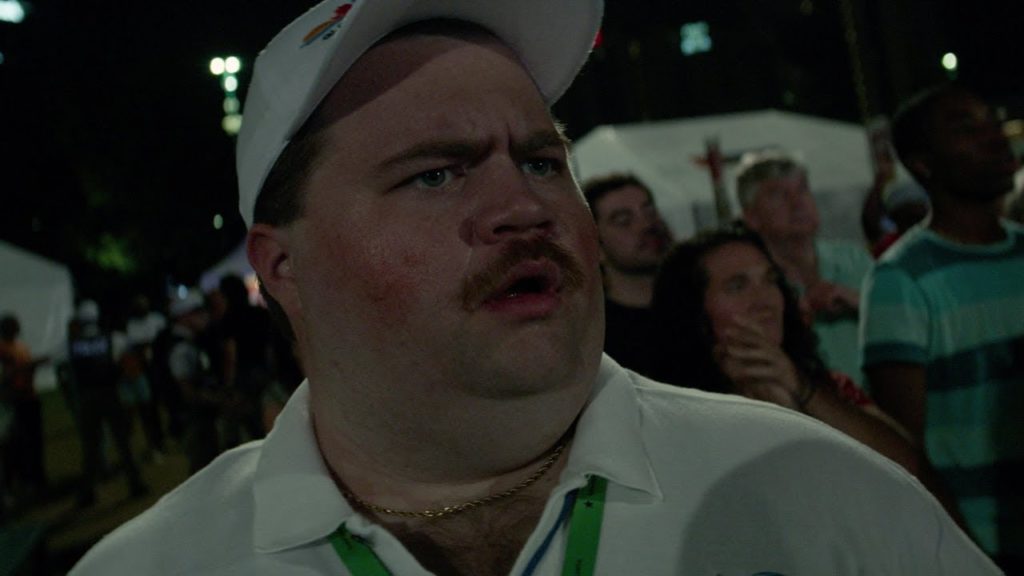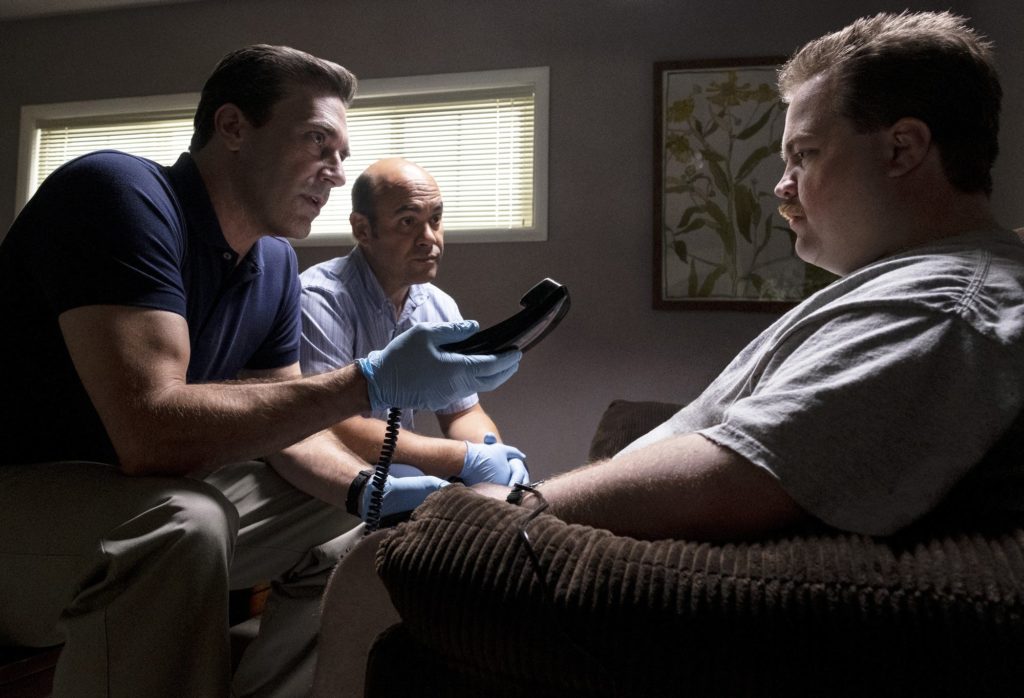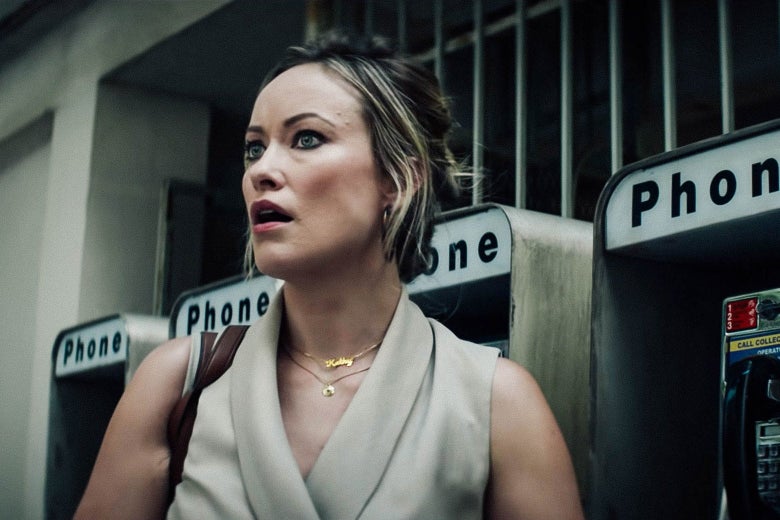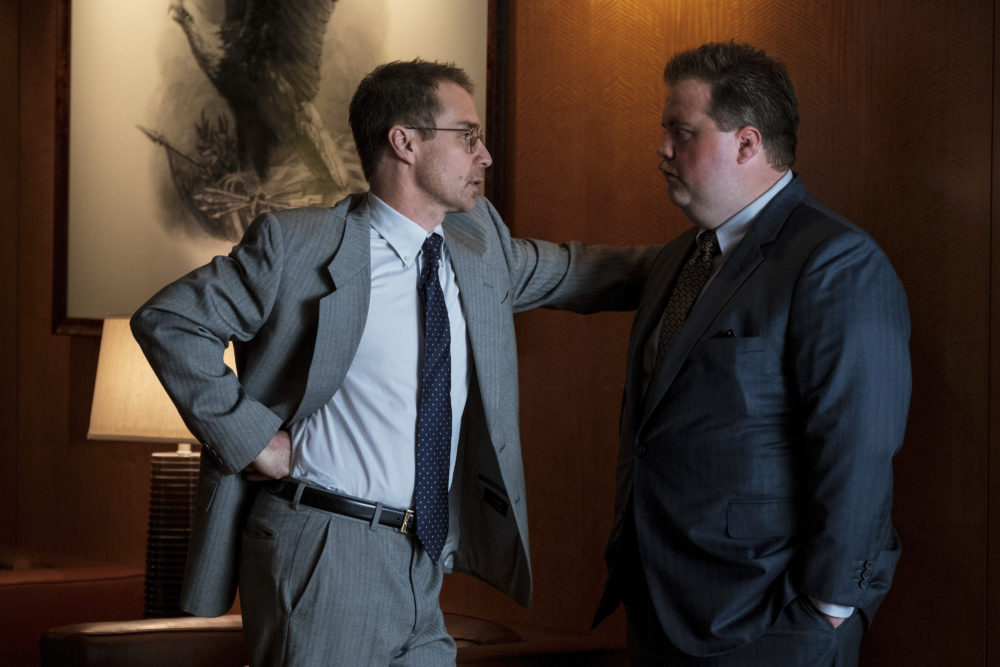
Even when they aren’t appearing in Westerns or war films, Clint Eastwood’s heroes routinely find themselves under siege. Earlier in his everlasting late period, in movies like Invictus and J. Edgar, Eastwood’s principals operated from inside the government, attempting to impose order and decency on a cruel and lawless world. Lately, however, The System itself has become Eastwood’s chief antagonist, a daunting power intent on smearing the names and ruining the lives of good men. In Sully, a skilled and noble pilot found himself the target of a biased and insidious bureaucratic inquiry. Now comes Richard Jewell, which dramatizes the 1996 Atlanta Olympics bombing and its aftermath, when the country collectively decided—based on hunches rather than evidence—that the doughy security guard who thwarted the attack was in fact the man who perpetrated it.
This material—an innocent man, railroaded!—is catnip for Eastwood, which means it plays to his worst instincts. Yet while Richard Jewell is clumsy and dubious, it is also fleet and colorful, featuring some of the director’s most relaxed and immersive filmmaking in years. It would be terrible if it weren’t so enjoyable.
It’s also a slight departure, in terms of character if not unsettling mood and haranguing themes. Whereas most Eastwood heroes are supremely competent and in fighting trim—in addition to Tom Hanks’ Sully, recall Bradley Cooper’s Navy SEAL in American Sniper or Matt Damon’s rugby player in Invictus (not to mention, like, every gunslinger the man with no name has ever played)—Richard begins the movie as something less than your classically rugged individual. He lives with his mother, Bobi (Kathy Bates), and is soon fired from his job as a rent-a-cop at Piedmont College, following complaints about his overzealous approach to campus security. As played by Paul Walter Hauser, who presumably earned the part following his terrific turn as an imbecilic thug in I, Tonya, Richard is both professional and pathetic, a man whose resolute commitment to the canon of law and order also makes him a bit of a jerk. Still, his exhausting rigor proves useful one fateful night at the Olympics, when he spots a solitary knapsack and insists on calling in the bomb squad. Within minutes, his colleagues’ groans of exasperation have turned into murmurs of panic.

Richard Jewell tends to work best when you can ignore its politics, which means it hums along beautifully during these early scenes. As usual, Eastwood employs an efficient, methodical approach that disdains flash, but his brisk pacing and canny cutting help build tension. The lead-up to the inevitable explosion—which involves belligerent teens, disgruntled roadies, and lots of skeptical cops—is a taut and engaging piece of suspense cinema.
Yet despite occasionally showcasing the trimmings of a thriller, Richard Jewell is not really a crime yarn. (You don’t need to have any familiarity with the actual events to know that Richard is innocent; Hauser’s deft and sympathetic performance makes that clear from the start.) It is instead a strident cautionary tale, a warning that formidable American institutions—not only law enforcement, but also the national media—can suppress an individual’s will and deprive him of his liberty. Based on little more than specious conjecture—along with a worrisome tip that comes from the most craven of professions, an academic—Richard becomes the primary target in the FBI’s investigation. From there, the movie draws its appeal as a sort of underdog tale, watching as this weak and helpless man struggles to shield himself against pointed assaults from venal representatives of the national establishment.
Of which there are two, and it’s hard to say which is more foul. In some of his finest works—Unforgiven and Mystic River come to mind—Eastwood shaded his characters with extraordinary subtlety, painting his villains not as avatars of evil but as corruptible men who nevertheless acted out of misguided righteousness. That is no longer the case. The heavies in Richard Jewell are conjured with all of the nuance of that vile pipe bomb. One is Tom Shaw (Jon Hamm), the FBI agent assigned to bring Richard down. He is smart, gruff, and more than willing to bend the rules in the pursuit of justice. In the ’70s, these qualities might have made him the film’s hero—squint just right, and you can perceive in Shaw the outline of Dirty Harry Callahan—but for Richard, they make him an absolute nightmare.

The concept of due process is a formalistic inconvenience for Shaw, and the movie is replete with scenes of him circumventing his quarry’s constitutional rights. These sequences—including an interrogation where Shaw tries to trick Richard into waiving his Miranda protections, and an impromptu attempt to bamboozle him into making incriminating statements as a purported way of clearing his name—are both appalling and, in their own weird way, entertaining. It’s like the old saw about being unable to look away from a train wreck, only applied to abuses of police power. That Shaw’s tactics may strain credulity is perhaps the point; Richard trusts authority figures implicitly, which makes him easy prey for a coordinated frame-up.
If Shaw’s misconduct lends Richard Jewell some of its more queasily watchable moments, the same isn’t quite true of the behavior of Kathy Scruggs (Olivia Wilde), the reporter for the Atlanta-Journal Constitution who seizes on Richard’s story like a vulture preying on a fresh carcass. With her come-hither outfits and unscrupulous ethics, Kathy is a walking cliché in high heels and low-cut dresses: the journalist who will do anything for a scoop, morals or integrity be damned. The film’s screenplay, by Billy Ray (adapted from both a book and a Vanity Fair article), suggests Kathy as the primary catalyst for Richard’s subsequent plight; it’s her inflammatory reporting that compels the FBI to bring him in for illicit questioning. (The scene where Kathy convinces her editor to run her story—shadows of Venetian blinds crisscrossing her face—recalls a similar moment in Official Secrets, only with hard-won triumph replaced by ideological bankruptcy.) Hamm and Wilde sell this toxic partnership with effortless sleaze; when Shaw leans forward to silkily whisper Richard’s name into Kathy’s ear, it’s as though they’re consummating a devilish pact between two nefarious forces. They make being bad look good.
Yet despite Wilde’s honeyed portrayal, the character of Kathy remains deeply problematic. Whether her actions as depicted here are accurate as a matter of history is not of particular concern to me; I tend to be tolerant of filmmakers stretching facts to create a good story. (Scruggs died in 2001; her former paper has vociferously objected to Eastwood and Wilde’s portraiture.) The issue is how Eastwood wields her awfulness as a broader symbol of the so-called crooked media, as though she’s wearing a nametag that reads, “Fake News, Southern Trollop edition.” It doesn’t help that she’s implied to be a poor writer, leaning on a male colleague to wordsmith her copy; a false redemption subplot wherein she eventually sees the error of her ways makes things even worse. Perhaps I’m overly sensitive in this area, given that the current U.S. President routinely wages war on the free press. All the same, Richard Jewell’s alarmist rhetoric—its notion that journalists manufacture stories rather than report them—comes off as retrograde and shortsighted.

What’s a hapless soul like Richard to do when targeted by such crude and potent enemies? Luckily for him, he knows a lawyer, a man named Watson Bryant; luckily for us, Watson is played by Sam Rockwell. The middle stretch of Richard Jewell, which finds Watson coaching the world’s worst client, transforms from a paranoid drama into a sort of mismatched buddy comedy. Watson is a veteran of the legal system who knows better than to trust Shaw and his shady cohorts; Richard, by contrast, considers himself an investigative peer—“I’m law enforcement too,” he says repeatedly—and is only too happy to volunteer information and consent to searches.
Watching this disconnect play out is an oddly delightful experience. The scenes where Richard and Watson interact with Shaw’s task force—“You don’t talk, I talk,” the attorney implores his client, who is constitutionally incapable of keeping his mouth shut—pulse with energy and flavor. Hauser is entirely convincing as a gullible patsy who gradually realizes that the net is tightening around him, but it’s Rockwell who brings real texture to the film, undercutting Eastwood’s sanctimony with his disillusioned intelligence. A weary but committed attorney (the wonderful Nina Arianda plays his secretary and sort-of lover), Watson insists that the only thing Richard is guilty of is being a decent human who looks out for others. And if you like Richard Jewell, the only thing you’re guilty of is admiring how a crafty director guides talented actors as their characters deceive, collaborate, and bicker.
For a time, at least. In its final act, Richard Jewell shifts from pleasurable to insufferable, as complex dynamics give way to grandiose speeches. The innocents are saved, the powerful are chastened, and the film’s lessons are imparted with screeching obviousness. It’s a disappointing climax from a movie that, despite its thematic flaws, initially resists easy sentimentality. But perhaps this was the real conspiracy, the true deception. His hero may never fire a gun, but Eastwood still finds a way to repeatedly hammer you over the head.
Grade: B-
Jeremy Beck is the editor-in-chief of MovieManifesto. He watches more movies and television than he probably should.
